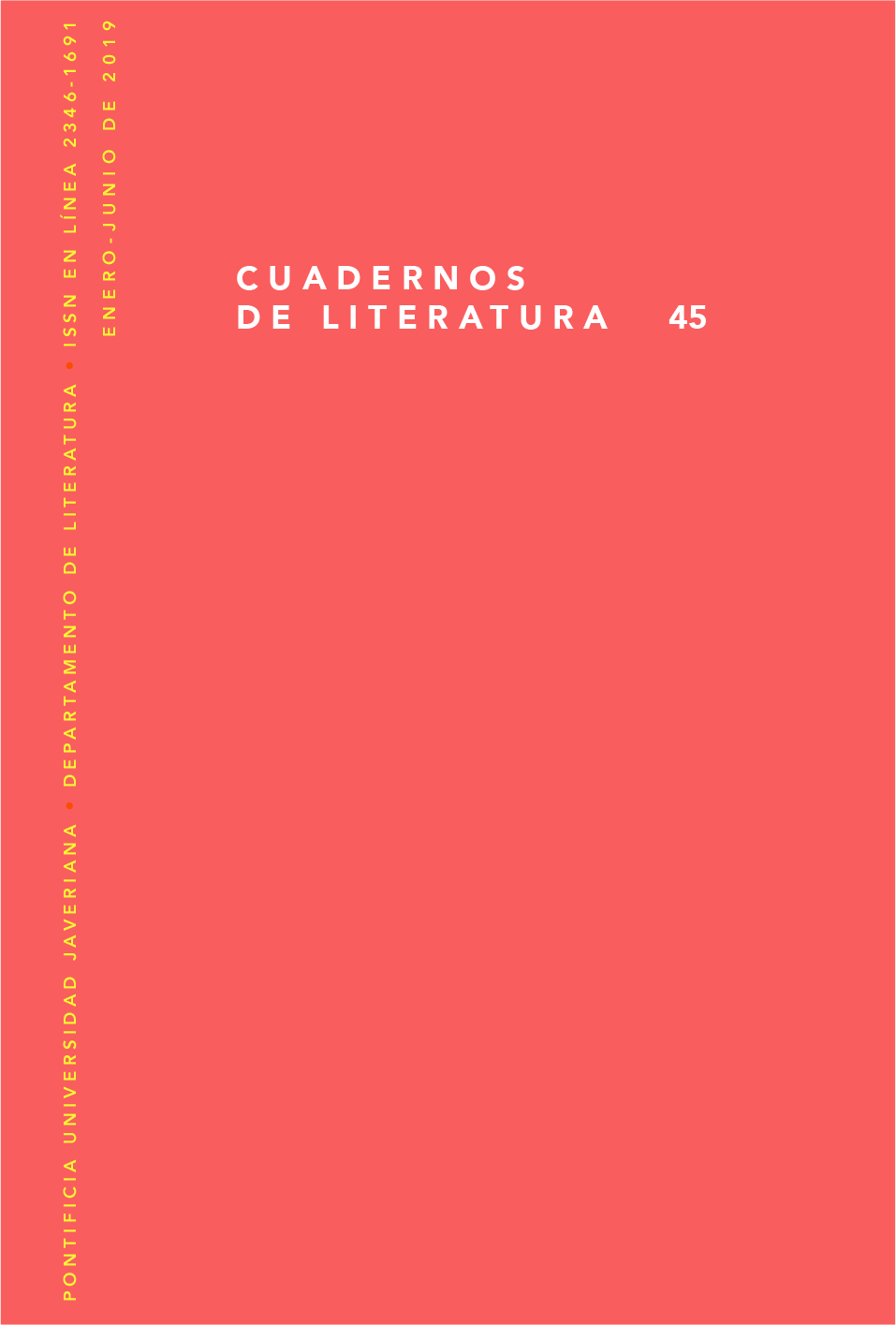Abstract
This article analyzes Fernando Vallejo´s El mensajero. Una biografía de Porfirio Barba Jacob, arguing that it stands for a posletrada or post-lettered position. In this case, the pos implies a position contradictory to the alienation by power of the modern writer as Ángel Rama denounced in his seminal book The Lettered City. Vallejo reveals in his novel the strategies of what I call sensitive networks –intellectual, artists, writers who articulate their life, senses and bodies around the nomadic life of Barba Jacob–. This also implies a reading of the modernization of the writer in spaces of slow or very fragmented modernity, through non-canonical cultural strategies.
Agamben, Giorgio. Lo abierto: el hombre y el animal. Buenos Aires: Adriana Hidalgo, 2016. Impreso.
Arévalo Martínez, Rafael. “El trovador colombiano”. El hombre que parecía un caballo. Madrid: Archivos, 1997. 15-30. Impreso.
Balderston, Daniel. “Los caminos del afecto: la invención de una tradición literaria queer en América Latina”. Revista de Crítica Literaria Latinoamericana 63/64 (2006): 117-130. PDF.
Chocano, José Santos. Memorias: las mil y una aventuras. Santiago: Nascimiento, 1940. Impreso.
Deleuze, Gilles y Felix Guattari. ¿Qué es la filosofía? Trad. Thomas Kauf. Barcelona: Anagrama, 2011. Impreso.
Delgado Aburto, Leonel. Márgenes recorridos: apuntes sobre procesos culturales y literatura nicaragüense del siglo XX. Managua: Instituto de Historia de Nicaragua y Centroamérica, 2002. Impreso.
Delgado Aburto, Leonel. “Subjetividad modernista y ordenamientos transoceánicos: la tensión hispano-caribeña en Martí, Silva y Barba Jacob”. Chasqui: Revista de Literatura Latinoamericana 45.1 (mayo, 2016): 220-231. Impreso.
Fernández Retamar, Roberto. Para una teoría de literatura hispanoamericana. Bogotá: Instituto Caro y Cuervo, 1995. Impreso.
Heidegger, Martin. Arte y poesía. Trad. y prólogo de Samuel Ramos. México: Fondo de Cultura Económica, 2006. Impreso.
Jitrik, Noé. Las contradicciones del modernismo. México: El Colegio de México, 1978. Impreso.
Laclau, Ernesto. La razón populista. Buenos Aires: Fondo de Cultura Económica, 2009. Impreso.
Laclau, Ernesto y Chantal Mouffe. Hegemonía y estrategia socialista: hacia una radicalización de la democracia. 3a. ed. Buenos Aires: Fondo de Cultura Económica, 2015. Impreso.
Marchart, Oliver. El pensamiento político posfundacional. Buenos Aires: Fondo de Cultura Económica, 2009. Impreso.
Musitano, Julia. “Lo propio y lo ajeno de una vida: una lectura decadente de Barba Jacob el mensajero de Fernando Vallejo”. Estudios de Literatura Colombiana 31 (2012): 173-95. PDF.
Ortega, Julio. Crítica de la identidad: la pregunta por el Perú en su literatura. México: Fondo de Cultura Económica, 1988. Impreso.
Perilli, Carmen. “Fijando sombras: una narrativa en busca de autores”. Revista de Crítica Literaria Latinoamericana 69 (2009): 51-67. PDF.
Rama, Ángel. La ciudad letrada. Hanover, N. H.: Ediciones del Norte, 2002. Impreso.
Rama, Ángel. Rubén Darío y el modernismo. Caracas: Universidad Central de Venezuela, 1970. Impreso.
Ramos, Julio. Desencuentros de la modernidad en América Latina. Santiago: Cuarto Propio, 2003. Impreso.
Vallejo, Fernando. El mensajero. Una biografía de Porfirio Barba Jacob. Bogotá: Alfaguara, 2003. Impreso.
Williams, Raymond. The Politics of Modernism. London: Verso, 1996. Impreso.
Cuadernos de Literatura is registered under a Creative Commons Attribution 4.0 International Public License. Thus, this work may be reproduced, distributed, and publicly shared in digital format, as long as the names of the authors and Pontificia Universidad Javeriana are acknowledged. Others are allowed to quote, adapt, transform, auto-archive, republish, and create based on this material, for any purpose (even commercial ones), provided the authorship is duly acknowledged, a link to the original work is provided, and it is specified if changes have been made. Pontificia Universidad Javeriana does not hold the rights of published works and the authors are solely responsible for the contents of their works; they keep the moral, intellectual, privacy, and publicity rights.
Approving the intervention of the work (review, copy-editing, translation, layout) and the following outreach, are granted through an use license and not through an assignment of rights. This means the journal and Pontificia Universidad Javeriana cannot be held responsible for any ethical malpractice by the authors. As a consequence of the protection granted by the use license, the journal is not required to publish recantations or modify information already published, unless the errata stems from the editorial management process. Publishing contents in this journal does not generate royalties for contributors.


